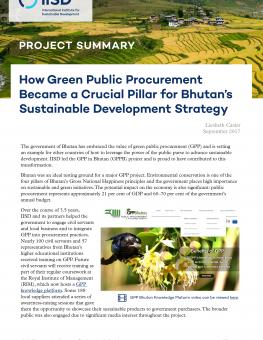
How Green Public Procurement Became a Crucial Pillar for Bhutan’s Sustainable Development Strategy
The Government of Bhutan has embraced the value of green public procurement (GPP) and is setting an example for other countries of how to leverage the power of the public purse to advance sustainable development. IISD led the GPP in Bhutan (GPPB) project and is proud to have contributed to this transformation.
The Government of Bhutan has embraced the value of green public procurement (GPP) and is setting an example for other countries of how to leverage the power of the public purse to advance sustainable development.
IISD led the GPP in Bhutan (GPPB) project and is proud to have contributed to this transformation.
Bhutan was an ideal testing ground for a major GPP project. Environmental conservation is one of the four pillars of Bhutan’s Gross National Happiness principles, and the government places high importance on sustainable and green initiatives. The potential impact on the economy is also significant: public procurement represents approximately 21 per cent of GDP and 60–70 per cent of the government’s annual budget.
Over the course of three and a half years, IISD and its partners helped the government to engage civil servants and local business and to integrate GPP into procurement practices. Read more about GPPB's achievements in this project summary.
You might also be interested in
Monitoring Progress in Green Public Procurement
This report outlines the importance of monitoring progress in green public procurement (GPP) and highlights various methodologies, challenges, and recommendations.
Gender Equality at the Heart of Recovery: Advocating for Gender-Responsive Procurement in Ukraine
Ukraine is already preparing for reconstruction, which will cost an estimated USD 411 billion and take at least 10 years. The integration of gender considerations into public procurement processes could generate greater inclusivity in a rebuilt Ukraine.
A Sustainable Asset Valuation of Non-Motorized Transport in Coimbatore, India
A Sustainable Asset Valuation (SAVi) of the economic, social, and environmental benefits of a non-motorized transport (NMT) network in Coimbatore, India.
FAQ: Legal Considerations When Using the CO2 Performance Ladder in Public Procurement
This report answers frequently asked questions about the legal aspects of using the CO2 Performance Ladder as a green public procurement tool.